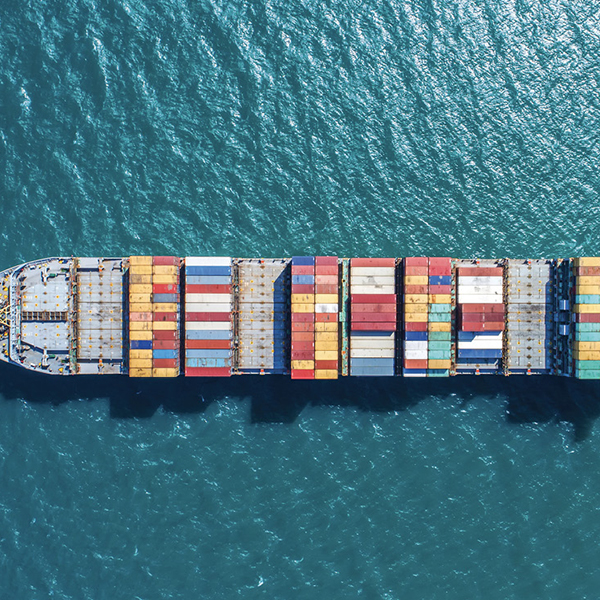Transportation bottlenecks on both land and sea are driving up freight prices for suppliers, and the situation may get worse before it gets better.
Importers are often faced with delays of weeks or even months getting their products into U.S. ports and delivered to warehouses and stores, the result of a combination of factors, including a shortage of trucks and drivers.
Ernest Esteban, vice president of business development at Ferrer Tradicional, an SFA member company which exports soups and sauces from Spain to several ports in the U.S., said the company’s transportation costs have more than tripled in the last few months. Those costs had already increased from 8 percent previously to 13 percent of total product costs during the pandemic, but rocketed to 34 percent of costs between July and September.
“When your costs increase from 13 percent to 34 percent, there is no way we can absorb the increase,” he said.
The high costs of bringing products into the U.S., which Esteban said he expected to continue for at least another year, could have a huge impact on the specialty food industry, he said. Consumers who previously had been willing to pay a little more for high-quality product from Europe, for example, might switch to lower-cost domestic products instead if the price differential becomes too great.
“Some shoppers are not going to be willing to pay this difference,” he said. “They will make decisions based on price first. It will be a choice of American products versus international products that come by ship.”
The transportation delays are resulting in erratic supply to retailers, said Esteban.
“It results in out of stocks, and that is the worst scenario for the retailer and the manufacturer, because there is nothing more expensive in retail than having an empty space,” he said.
Similarly, Live Kuna, a vertically integrated maker of better-for-you snacks and gluten-free flours, has also experienced increased costs bringing products in from Ecuador, where it buys ingredients directly from local farmers and processes them for export to the U.S. and other countries.
The company has had to manage long lead times since the beginning of the pandemic, when Ecuador placed restrictions on exports, giving preference to products such as bananas, a major crop for the South American nation.
“If we wanted to have a spot on a vessel, we had to wait, and if we did not want to wait, we had to fly, and that was ridiculous for a snack because of the cost,” said Santiago Stacey, co-founder and CEO at Live Kuna.
The company has managed to work around those challenges, but continues to face increasing delays and cost pressures shipping its products into the U.S., and transporting them to stores with enough time left on their expiration dates.
The company’s Kuna Pops, puffed snacks made from quinoa and other ingredients, last about 12 months from the time of manufacture, but it is now sometimes taking up to four months to get products to retail shelves. That can force the company to offer discounts to move product faster and eat into the company’s profits.
Stacey said Live Kuna has resisted raising its prices, however. Sourcing ingredients directly from farmers has helped keep its ingredient costs steady, and the company has been able to absorb increased freight costs that have risen at least 10-15 percent, and in some cases as much as 20-25 percent.
As a relatively small company, Live Kuna ships by the pallet load rather than by the truckload, and which also makes on-time delivery more challenging.
Stacey said he's optimistic that the company’s ability to keep prices in check could help it be more competitive against more traditional products as other companies raise prices.
“I think that could be an opportunity for companies like us that make better-for-you products, if companies that are not using better ingredients no longer have price as a competitive advantage,” he said. “I hope that more people will be gravitating to products with better, natural ingredients, if price is not an obstacle. At least they will be able to entertain the idea of buying those products.”
Logistics are also a concern for the last mile of delivery to people’s homes, said Leslie Bowers, who owns SFA member company Elegant Brie with her sister, Linda Olander.
The company’s signature product, brie-en-croute, was recently named one of “Oprah’s Picks,” which Bowers said is expected to drive up demand even higher than previously expected during the busy holiday season.
Bowers said the company has been very proactive this year in ensuring that all of its ingredient suppliers were prepared, after some of its cheese suppliers were unable to deliver some products last year.
“We have trusted and loyal suppliers, and we worked with them very early because it’s the holiday season anyway,” she said. “Even though we did absolutely everything we could, we could still have a problem.”
Bowers is particularly concerned about the potential for delays in FedEx and UPS delivery to customers, which is a major concern for highly perishable product such as cheese. Last year, the company encountered logistics problems shipping products across the country because of a lack of trucks and high freight rates, after appearing on the Home Shopping Network.
“This year we did our best to anticipate every detail,” she said. “We are a small business, we have an great product, and we just want to get it across the finish line. We want people to enjoy the holidays, and give great gifts.”
How is your company dealing with supply chain issues? Weigh in here on the specialtyfood.com Community Hub.
Related: Report: CPG Category Faces Continued Supply Chain, Labor Challenges; USDA to Spend $4 Billion to Strengthen Supply Chain.

